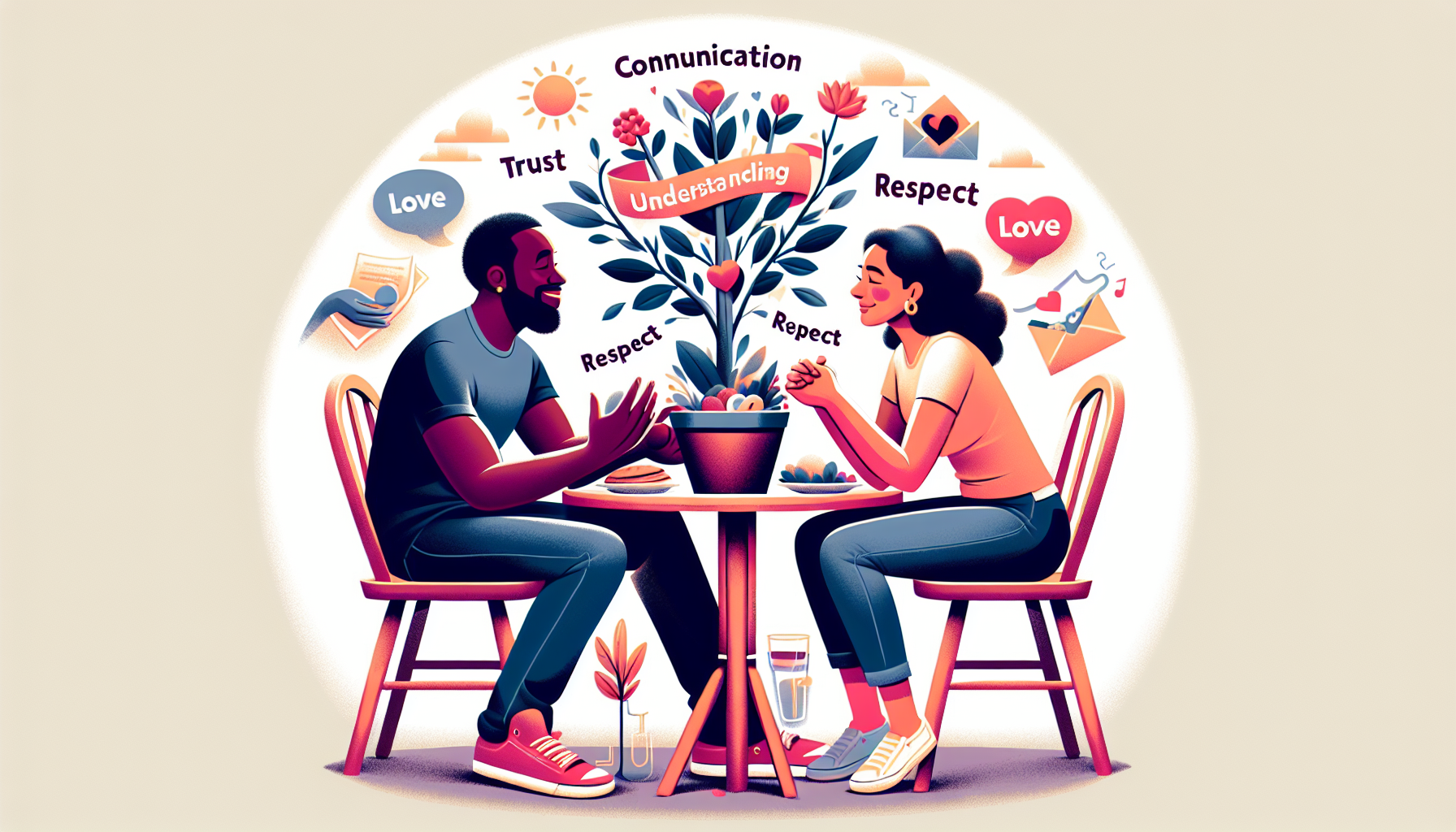Effective Communication in Relationships
Effective communication is a cornerstone of any healthy relationship. For couples, mastering the art of communication can significantly enhance their bond and resolve potential conflicts.
Positive Conversations
Starting conversations on a positive note is crucial for fostering understanding and connection. Positive conversations create an environment where both partners feel valued and heard. According to Relationships Australia, couples should focus on embracing vulnerability, finding common ground, and addressing important issues instead of sweeping them under the rug.
To maintain positivity in conversations:
- Begin with a compliment or appreciation.
- Use "I" statements to express feelings without blaming.
- Show empathy and understanding.
Right Timing for Discussions
Choosing the right moment to discuss important topics can make a significant difference in the outcome of the conversation. It's essential to ensure both partners are in a calm and receptive state before diving into serious discussions.
Consider the following tips for timing:
- Avoid starting discussions when either partner is stressed or tired.
- Pick a quiet and private setting.
- Schedule dedicated time for regular check-ins.
Personal Communication Accountability
Taking responsibility for one's communication style and behavior is key to effective dialogue. Personal accountability means acknowledging and owning up to communication issues such as silence, defensiveness, or control.
To practice personal communication accountability:
- Reflect on personal communication habits.
- Apologize when necessary and seek to make amends.
- Commit to improving communication skills.
By focusing on positive conversations, choosing the right timing for discussions, and taking personal accountability, couples can build stronger, more effective communication patterns. For more tips on enhancing your relationship, visit our communication in relationships and how to improve relationship articles.
Handling Conflict in Relationships
Conflicts are inevitable in any relationship. Understanding and managing these disagreements can help couples grow stronger together. This section explores the dynamics of verbal disagreements, healthy resolution strategies, and recognising abuse signs.
Understanding Verbal Disagreements
Verbal disagreements are a common part of relationships. They occur when individuals express differing opinions or feelings. It's crucial to communicate effectively to understand each other better and strengthen the relationship. Common communication issues that can lead to conflict include silence, repeating the same points, defensiveness, control, escalations, and a mentality of conditional change.
Resolving Arguments Healthily
Resolving arguments in a healthy manner involves several key strategies:
- Establishing Boundaries: Ensure mutual respect during discussions.
- Identifying the Real Issue: Focus on the root cause of the disagreement.
- Agreeing to Disagree: Sometimes, accepting differences is necessary.
- Compromising: Find middle ground that satisfies both parties.
- Considering Each Other's Viewpoints: Understand and acknowledge your partner's perspective.
Here is a table summarising these strategies:
| Strategy | Description |
|---|---|
| Establishing Boundaries | Ensure respect and avoid personal attacks. |
| Identifying Real Issues | Focus on the underlying cause of the argument. |
| Agreeing to Disagree | Accept differences without forcing agreement. |
| Compromising | Find a solution that meets both partners' needs. |
| Considering Viewpoints | Acknowledge and understand each other's perspectives. |
For more tips on resolving conflicts, visit our article on communication in relationships.
Identifying and Addressing Abuse Signs
Conflict should never lead to personal attacks or attempts to undermine self-esteem. Such behaviours can be indicative of abuse. Signs of abuse include:
- Verbal Assaults: Insults, name-calling, or derogatory remarks.
- Emotional Manipulation: Guilt-tripping, gaslighting, or controlling behaviour.
- Physical Intimidation: Threats or physical harm.
If these behaviours are present, it's crucial to recognise the signs and seek help. Addressing abuse promptly is essential for the safety and well-being of both partners. For further support, consider seeking marriage counselling or professional help.
For more information on recognising healthy relationship signs, check out our article on signs of a healthy relationship.
Nurturing Relationships and Work-life Balance
Maintaining a healthy balance between work and personal life is crucial for nurturing relationships. This involves prioritising time together, fostering open communication, setting boundaries, and building trust.
Importance of Time Together
Spending quality time together is essential for strengthening relationships. Ensuring that both partners are fully present during shared moments can significantly enhance the bond. According to LinkedIn, being stressed and overworked can lead to being less present, more irritable, and less engaged in relationships. Thus, dedicating time to relax and enjoy each other's company is paramount.
Table: Weekly Hours Spent Together
| Activity | Average Hours per Week |
|---|---|
| Shared Meals | 7 |
| Leisure Activities | 5 |
| Conversations | 3 |
Open Communication and Boundaries
Open communication is fundamental in any relationship. It involves expressing feelings honestly and listening actively to one's partner. Setting boundaries ensures that both partners respect each other's needs and personal space. As noted by LinkedIn, setting boundaries and communicating openly are vital components of a healthy work-life balance.

For more insights on effective communication, visit our article on communication in relationships.
Key Points for Open Communication:
- Express feelings honestly
- Listen actively
- Respect each other's needs
- Set and respect boundaries
Trust as a Foundation
Trust is the cornerstone of any strong relationship. It is considered the number one characteristic people seek in a partner (Michigan State University Extension). Trust fosters a sense of security and enables partners to feel confident in relying on each other.
Leading relationship experts, John and Julie Gottman, highlight that qualities related to trust and trustworthiness are the most crucial characteristics individuals seek in a spouse or partner.
For more detailed information on building trust, visit our page on signs of a healthy relationship.
Elements of Trust:
- Reliability
- Honesty
- Consistency
- Transparency
By prioritising time together, fostering open communication, and building trust, couples can nurture their relationships while maintaining a healthy work-life balance. For more relationship advice, check our articles on dating tips, relationship advice for men, and relationship advice for women.
Enhancing Relationship Dynamics
Enhancing the dynamics of a relationship involves several key elements that help to build a stronger bond between partners. By focusing on active listening, quality time, and showing gratitude, couples can create a more harmonious and fulfilling relationship.
Active Listening and Understanding
Active listening is crucial in understanding your partner better and showing genuine interest in their thoughts and feelings. It involves giving your partner full attention, internalising what they say, and asking questions that make them feel understood. This practice can significantly strengthen the relationship.
Some tips for active listening include:
- Maintaining eye contact
- Nodding in agreement
- Avoiding interrupting
- Reflecting on what was said
For more on effective communication techniques, visit our section on communication in relationships.
Quality Time and Relationship Rules
Quality time is essential for maintaining a strong connection. Implementing the 2–2–2 rule can simplify scheduling and enhance the relationship. This rule involves:
- Scheduling a quality date night every 2 weeks
- Going on a weekend getaway every 2 months
- Taking a long vacation every 2 years
| Quality Time Activity | Frequency |
|---|---|
| Date Night | Every 2 Weeks |
| Weekend Getaway | Every 2 Months |
| Long Vacation | Every 2 Years |
For more date ideas, check out our dating tips section.
Gratitude and Compromise
Regularly expressing gratitude can significantly improve satisfaction and happiness in any relationship. Simple gestures like saying "thank you" or leaving heartfelt notes can activate the brain's reward centre, releasing feel-good chemicals like dopamine and serotonin.
A healthy relationship also involves compromise and understanding. Both partners should consider each other's needs and desires, finding ways to meet in the middle. This can even apply to minor decisions, such as choosing where to eat.
Tips for showing gratitude and compromising:
- Acknowledge your partner’s efforts
- Be willing to meet halfway
- Use "we" instead of "I" during discussions
For more advice on improving your relationship, visit our article on how to improve relationship.
By focusing on these aspects, couples can enhance their relationship dynamics and build a stronger, more loving bond. For additional guidance, explore our sections on relationship advice for men and relationship advice for women.
Conflict Resolution Strategies
Conflict is a natural part of any relationship, and how it's handled can significantly impact the relationship's health and longevity. Here are some effective strategies for managing and resolving conflicts in romantic relationships.

Effective Conflict Management
Effective conflict management involves several key skills, including understanding one's own feelings, practicing active listening, and using assertive communication. These skills help in addressing conflicts constructively.
- Understanding Feelings: Journaling can be beneficial in identifying and expressing emotions. It allows individuals to reflect on their feelings before discussing them with their partner.
- Active Listening: This involves fully focusing on and understanding the other person's perspective. It means not interrupting and acknowledging their feelings.
- Assertive Communication: This means expressing one's feelings and needs clearly and respectfully without being aggressive (Verywell Mind).
For more on enhancing communication skills, visit our page on communication in relationships.
Establishing Boundaries and Apologies
Establishing boundaries and knowing when to apologize are crucial in preventing and resolving conflicts.
- Setting Boundaries: Clear boundaries help ensure respect and understanding in a relationship. This includes respecting each other's opinions and personal space.
- Apologizing: Apologizing when necessary can prevent conflicts from escalating. A sincere apology shows accountability and a willingness to resolve the issue (Verywell Mind).
| Conflict Resolution Skills | Description |
|---|---|
| Understanding Feelings | Reflecting on and journaling your emotions |
| Active Listening | Fully focusing on and understanding the other person's perspective |
| Assertive Communication | Expressing feelings and needs clearly and respectfully |
| Setting Boundaries | Ensuring respect and personal space |
| Apologizing | Showing accountability and willingness to resolve issues |
For more tips on maintaining a healthy relationship, see our article on signs of a healthy relationship.
Seeking Professional Help if Needed
There are times when conflicts cannot be resolved within the relationship, and seeking professional help becomes necessary.
- Marriage Counseling: Professional counselors can provide a neutral space for couples to discuss their issues and find solutions. They offer tools and strategies to manage conflicts effectively (Verywell Mind).
- Third-Party Mediation: Having a trusted individual present during conflict resolution can help mediate and offer an unbiased perspective.
- Recognizing When to Step Back: Sometimes, putting some distance or even ending the relationship may be necessary for personal safety and well-being (Verywell Mind).
For more information on seeking help, visit our page on marriage counseling.
By implementing these conflict resolution strategies, couples can navigate disagreements more effectively and foster a healthier, more supportive relationship. For more relationship advice, check out our articles on dating tips and relationship advice for men.
Communication Mistakes to Avoid
In any relationship, effective communication is the cornerstone of understanding and connection. However, certain common errors can severely impact the harmony and strength of a partnership. This section delves into these mistakes and how to address them to foster better communication.
Impact of Common Errors
Mistakes in communication, such as comparisons, recrimination, and misunderstandings, can harm relationships significantly and lead to deteriorating connections. Recognizing and rectifying common communication errors is essential for maintaining the strength and longevity of relationships (Psychology Today).
| Common Communication Errors | Impact on Relationship |
|---|---|
| Comparisons | Creates feelings of inadequacy and resentment |
| Recrimination | Leads to blame and defensiveness |
| Misunderstandings | Causes unnecessary conflict and distance |
Extensive research by John Gottman has shown that a couple's communication patterns can predict the success of their relationship. Effective communication fosters intimacy, emotional closeness, and resolution of conflicts constructively, enhancing the trust and connection within the relationship.
Addressing Misunderstandings
Conflicts often arise due to misunderstandings and miscommunication rather than the actual content of the situation. It is crucial to address the underlying messages being sent and received rather than focusing solely on the facts or details of a disagreement to resolve the issue at a deeper, relationship level (Psychology Today).
Techniques to address misunderstandings include:
- Active Listening: Truly hear what your partner is saying without interrupting.
- Paraphrasing: Repeat back what you heard to ensure understanding.
- Empathy: Try to understand your partner’s feelings and perspective.
These techniques can transform conflicts into growth opportunities, fostering understanding and collaboration in various aspects of life.
Strengthening Relationships through Communication
Effective communication is a powerful tool that positively transforms relationship dynamics. By employing strategic communication involving questions, paraphrasing, common ground, active listening, and empathy, conflicts can be turned into growth opportunities, fostering understanding and collaboration in various aspects of life (Psychology Today).
| Communication Strategy | Benefit |
|---|---|
| Asking Questions | Encourages open dialogue and understanding |
| Paraphrasing | Ensures clarity and prevents misunderstandings |
| Finding Common Ground | Strengthens connection and unity |
| Active Listening | Shows respect and validates feelings |
| Empathy | Builds emotional closeness and trust |
Communication is a crucial component in relationships, including friendships, family bonds, and romantic partnerships. While good communication is essential for deeper and lasting connections, relationship happiness is influenced by positive interaction, shared values, personality traits, and stress levels (Psychology Today).
For more guidance on nurturing your relationship and communication, explore our articles on communication in relationships and love advice. Additionally, consider seeking professional help if needed to address deeper issues and foster a healthier relationship dynamic.

























Post Comment
You must be logged in to post a comment.